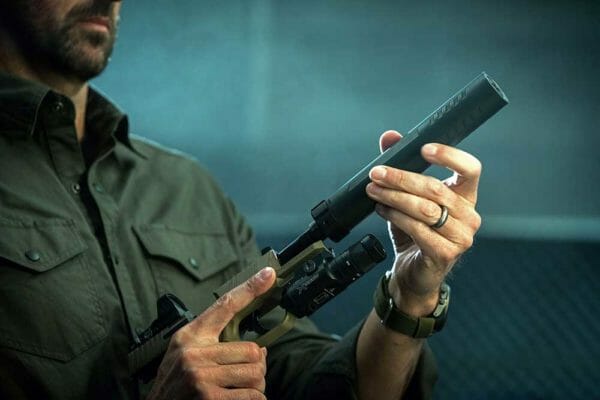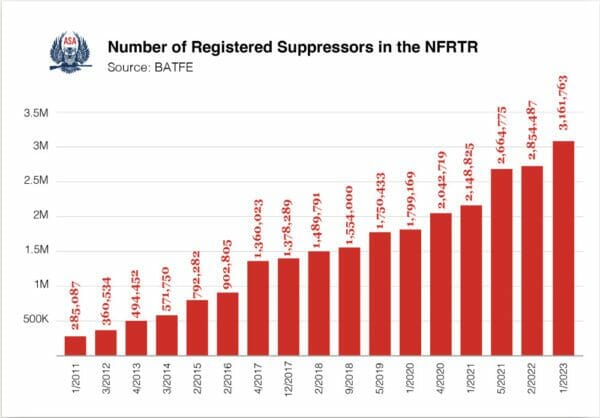
U.S.A. — In the United States District Court for the Southern District of Illinois, on November 25, 2022, Larry Morse and Theodore Ray Buck, Jr. filed a lawsuit against the state of Illinois, claiming the state ban on the sale and possession of silencers violates the Second Amendment. A similar lawsuit was filed by Carlin Anderson and David Clark on February 27, 2023, backed by the American Suppressor Association. The two lawsuits, Morse v Raoul and Anderson v Raoul, have been consolidated as of June 15, 2023. The parties involved have agreed the principle area of contention is whether silencers are arms protected by the Second Amendment. Morse and other plaintiffs claim silencers are obviously bearable arms and are in common use, so they cannot be banned from ownership as they are in Illinois. Here are excerpts from the pleading in Morse v. Raoul. From courlistener.com:
29. As of 2020, there were 2,042,719 suppressors owned by law abiding citizens as registered in the National Firearms Registration and Transfer Record (“NFRTR”), far more than was needed for the DC Circuit to find AR-15s in common use. And that is despite legal impediments to owning a silencer, including the National Firearms Act requirements—paying a $200 transfer tax, submitting a detailed application and fingerprints, and a multi months-long wait for the federal government to process the application. See26 U.S.C. § 5811. Even arms that are far less common have been found to be protected.
Plaintiffs point out that silencers are used for numerous lawful purposes. From the complaint:
33. And the primary purpose of suppressors are for lawful purposes, including hunting, which Heller v. District of Columbia, 399 U.S. App. D.C. 314, 331, 670 F.3d 1244, 1261 (2011) holds is part of the Second Amendment right, self-defense (the core right pursuant to District of Columbia v. Heller, 554 U.S. 570, 628, 128 S. Ct. 2783, 2817 (2008)) and target shooting which both the Seventh and Third Circuits have already found to be protected Second Amendment conduct. The right to self-defense “implies a corresponding right to acquire and maintain proficiency” with common weapons. Ezell v. City of Chicago, 651 F.3d 684, 704 (7th Cir. 2011) [hereinafter Ezell I].
Silencers are in common use. They are used for numerous lawful purposes, including self-defense. The major contention of the State of Illinois is silencers are not arms, they are merely an accessory. From the motion by the defendants:
Defendants Kwame Raoul, Brendan F. Kelly, Craig Miller, and Bryan Robbins respectfully move the Court to enter judgment in their favor pursuant to Federal Rule of Civil Procedure 12(c). Plaintiffs raise a Second Amendment challenge to an Illinois law prohibiting the possession of silencers, which are attached to firearms to reduce the noise of gunfire. But the Second Amendment protects only “the right of the people to keep and bear Arms” (emphasis added). Silencers are not weapons. They are not used for self-defense. And they are not necessary to the effective use of a firearm. So they are not “Arms” within the meaning of the constitutional text, and thus plaintiffs cannot prevail on their Second Amendment claim.

Two problems exist with the above claim. The first is that silencers are explicitly treated as arms in both Illinois and federal law. While silencers are not “arms” by themselves, they clearly add to the effectiveness of firearms and aid in the use of firearms for lawful purposes such as self-defense. The second is accessories, which make arms more effective, such as aiding in training, are protected under the Second Amendment. The State of Illinois claim could be used to ban magazines (currently under contention) or other firearms accessories such as telescopic sights, red dot sights, flash suppressors, or even such things as rifled barrels or recoil pads.
The Supreme Court, in Caetano, made clear all items which constitute bearable arms fall under the protection of the Second Amendment. Outright bans on bearable arms are not allowed if the arms are in common use for lawful purposes.
This is why the State of Illinois is contending silencers are not arms. If they are not arms, why are they regulated and banned, especially under Illinois and United States weapons statutes? Illinois code 720 ILCS 5/24-1(a)(6) bans the possession of any device or attachment designed, used or intended for use in silencing the report of a firearm. If they are not useful to make firearms more effective, why ban or restrict them?
If the court rules silencers are arms under the protection of the Second Amendment, the Texas lawsuit against the NFA restrictions on making silencers gains credibility.
What Illinois is attempting to do is a salami slice destruction of the Second Amendment. Under the theory that accessories, which make weapons more effective, can be banned, the Second Amendment could be reduced to the absurdity of allowing only a single, muzzle-loading shotgun for defense in the home. Such an absurd outcome is not allowed under the Second Amendment.
About Dean Weingarten:
Dean Weingarten has been a peace officer, a military officer, was on the University of Wisconsin Pistol Team for four years, and was first certified to teach firearms safety in 1973. He taught the Arizona concealed carry course for fifteen years until the goal of Constitutional Carry was attained. He has degrees in meteorology and mining engineering, and retired from the Department of Defense after a 30 year career in Army Research, Development, Testing, and Evaluation.

from https://ift.tt/08CvNnm
via IFTTT

No comments:
Post a Comment